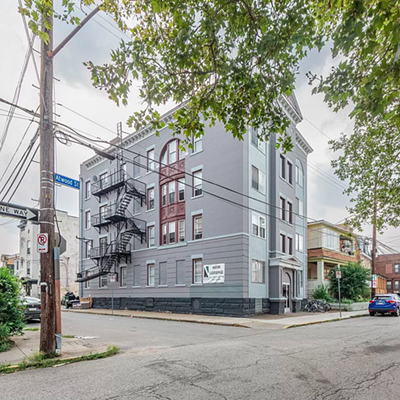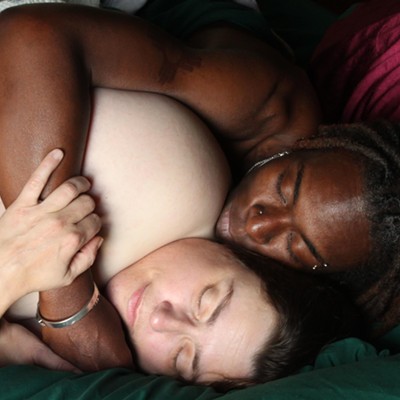In the days when slavery was legal in Pennsylvania, how many slaves were owned here?
Question submitted by: Joseph Forbes, South Side
Some readers may be surprised that there were any slaves in Pittsburgh. After all, even though one can seemingly find more Confederate flags on bumper stickers here than in any other city north of the Mason-Dixon line, Pittsburgh has a proud abolitionist tradition. It was a key stop on the "Underground Railroad" for fugitive slaves, and a hotbed of Union sentiment before and during the Civil War.
In truth, as with most obnoxious things, slavery was far more prevalent in Philadelphia. S. Trevor Hadley's Only in Pittsburgh cites statistics that show that of the more than 500 slaves living in Pennsylvania in 1800, most were located around Philadelphia. This was partly because human beings were the ultimate status item of the day: Slaves, Hadley writes, provided a "way in which wealthier citizens along the East Coast could demonstrate their social importance." By contrast, in less status-conscious Allegheny County, there were only 64 slaves.
Still, it would be wrong to ascribe any sort of moral superiority to the western part of the state. This was still frontier country, where farms were small and getaways would be easy. As Leland Baldwin puts it, while "[s]lavery was never a flourishing institution in western Pennsylvania," this was "more because of economic reasons than moral scruples."
In fact, among those most likely to own slaves were the local clergy. Historical accounts indicate that as many as a half-dozen Pittsburgh-area ministers owned slaves, and that many church elders did as well. Hard to believe, I know, but if it weren't for religious hypocrisy, we wouldn't have the Catholic Church offering spiritual counsel on what kind of sexual relationships are appropriate for those of us who aren't priests.
Of course, spiritual leaders weren't alone in having a double standard. Hugh Henry Brackenridge once noted that many slave owners were people who wouldn't think of "hav[ing] shaved their beards on Sunday," for fear of profaning the Sabbath. Some of Pittsburgh's leading luminaries owned slaves, establishing the important historical precedent that if you want to make a name for yourself in this town, it never hurts to treat your labor badly.
Some of the city's very streets are named after slaveowners: The Bucks write that John Neville owned 18 slaves, for example, and Isaac Craig (for whom Craig Street) is named owned eight. And early editions of the Pittsburgh Gazette were partly financed by classified ads engaged in the buying and selling of slaves. (One 1787 edition, for example, featured an ad offering for sale "a negro wench." After asserting that the slave was "an excellent cook and can do any kind of work in or out of doors," the seller noted that in lieu of cash "produce will be taken or cattle of any kind."
But already slavery was being phased out. In 1780, Pennsylvania passed a "gradual abolition" act, which mandated that children born of slaves would be free after the age of 28, and that no new slaves could be brought into the state. The act was a somewhat tortured attempt at compromise on an uncompromising issue: It required, for example, that if a jury convicted a slave and gave him the death penalty, the state would reimburse the slave's owner for the value of his lost "property." Slave owners, apparently, were the real victims.
Despite the measure's shortcomings, it did lead to a steady decline in the number of slaves held across the state. In 1790, the first year of the U.S. Census, there were 880 slaves in the region, 159 of whom lived in Allegheny County. By 1820, the number of slaves in the region had dropped to 70, only one of whom lived in Allegheny. The number of free African Americans, meanwhile, increased from under 150 in 1790 to more than 3,700 by 1820.
That's not to say life always got easier for blacks when they were free. In 1837, more than a half-century after the gradual abolition act, Pennsylvania took the vote away from blacks. Today, of course, we just don't give them anyone to vote for, as many local African Americans can attest. But throughout the pre-Civil War period, writes Laurence Glasco in an essay collected in City at the Point, "black Pittsburghers faced daily indignities and threats to their personal and civil rights. They were excluded from, or confined to separate sections of, the city's theaters, restaurants, and hotels." And though they were "occasionally & attacked by white mobs," Glasco notes, "they were spared the major riots that convulsed black communities in New York, Philadelphia, and Cincinnati."
.
In truth, as with most obnoxious things, slavery was far more prevalent in Philadelphia. S. Trevor Hadley's Only in Pittsburgh cites statistics that show that of the more than 500 slaves living in Pennsylvania in 1800, most were located around Philadelphia. This was partly because human beings were the ultimate status item of the day: Slaves, Hadley writes, provided a "way in which wealthier citizens along the East Coast could demonstrate their social importance." By contrast, in less status-conscious Allegheny County, there were only 64 slaves.
Still, it would be wrong to ascribe any sort of moral superiority to the western part of the state. This was still frontier country, where farms were small and getaways would be easy. As Leland Baldwin puts it, while "[s]lavery was never a flourishing institution in western Pennsylvania," this was "more because of economic reasons than moral scruples."
In fact, among those most likely to own slaves were the local clergy. Historical accounts indicate that as many as a half-dozen Pittsburgh-area ministers owned slaves, and that many church elders did as well. Hard to believe, I know, but if it weren't for religious hypocrisy, we wouldn't have the Catholic Church offering spiritual counsel on what kind of sexual relationships are appropriate for those of us who aren't priests.
Of course, spiritual leaders weren't alone in having a double standard. Hugh Henry Brackenridge once noted that many slave owners were people who wouldn't think of "hav[ing] shaved their beards on Sunday," for fear of profaning the Sabbath. Some of Pittsburgh's leading luminaries owned slaves, establishing the important historical precedent that if you want to make a name for yourself in this town, it never hurts to treat your labor badly.
Some of the city's very streets are named after slaveowners: The Bucks write that John Neville owned 18 slaves, for example, and Isaac Craig (for whom Craig Street) is named owned eight. And early editions of the Pittsburgh Gazette were partly financed by classified ads engaged in the buying and selling of slaves. (One 1787 edition, for example, featured an ad offering for sale "a negro wench." After asserting that the slave was "an excellent cook and can do any kind of work in or out of doors," the seller noted that in lieu of cash "produce will be taken or cattle of any kind."
But already slavery was being phased out. In 1780, Pennsylvania passed a "gradual abolition" act, which mandated that children born of slaves would be free after the age of 28, and that no new slaves could be brought into the state. The act was a somewhat tortured attempt at compromise on an uncompromising issue: It required, for example, that if a jury convicted a slave and gave him the death penalty, the state would reimburse the slave's owner for the value of his lost "property." Slave owners, apparently, were the real victims.
Despite the measure's shortcomings, it did lead to a steady decline in the number of slaves held across the state. In 1790, the first year of the U.S. Census, there were 880 slaves in the region, 159 of whom lived in Allegheny County. By 1820, the number of slaves in the region had dropped to 70, only one of whom lived in Allegheny. The number of free African Americans, meanwhile, increased from under 150 in 1790 to more than 3,700 by 1820.
That's not to say life always got easier for blacks when they were free. In 1837, more than a half-century after the gradual abolition act, Pennsylvania took the vote away from blacks. Today, of course, we just don't give them anyone to vote for, as many local African Americans can attest. But throughout the pre-Civil War period, writes Laurence Glasco in an essay collected in City at the Point, "black Pittsburghers faced daily indignities and threats to their personal and civil rights. They were excluded from, or confined to separate sections of, the city's theaters, restaurants, and hotels." And though they were "occasionally & attacked by white mobs," Glasco notes, "they were spared the major riots that convulsed black communities in New York, Philadelphia, and Cincinnati."
.










